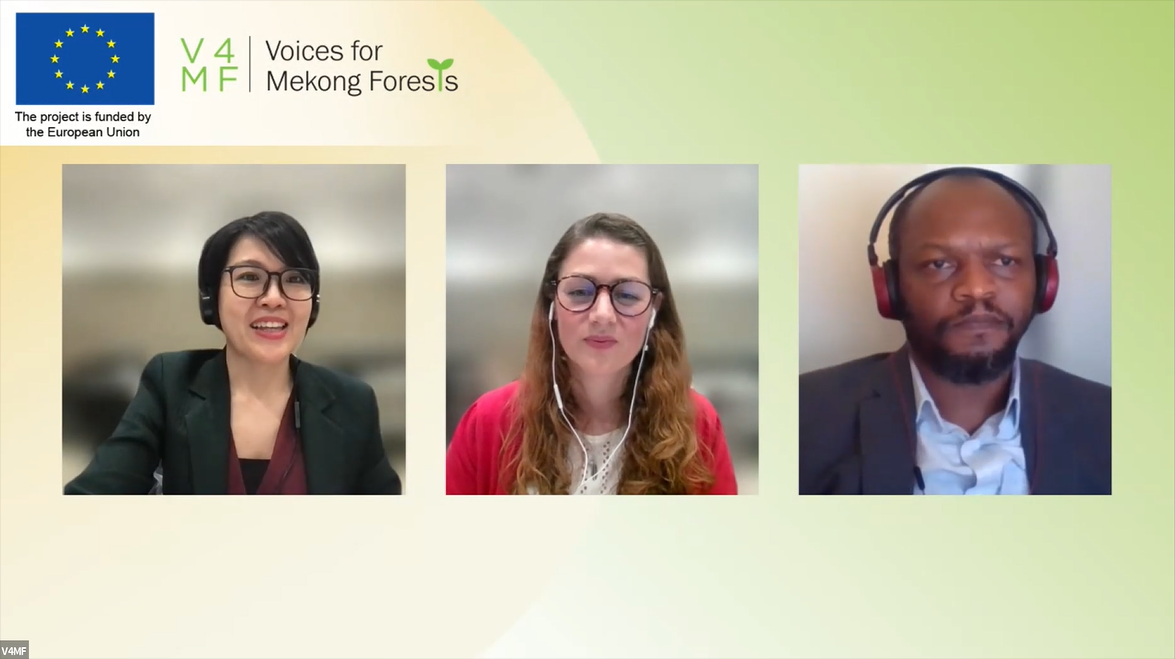Role of civil society has evolved to improve forest governance in the Mekong region

Civil society organizations have been on the frontline of improving forest governance across the Mekong region over the past five years as part of the European Union-funded Voices for Mekong Forests (V4MF) project.
“The V4MF project has developed strong mechanisms for participation and collaboration among different stakeholders,” said Saroj Srisai, programme officer at the Delegation of the European Union to Thailand. “As local communities have become more aware of their rights and obligations in forest governance processes, land disputes have been resolved. In addition, the customary rights for use of resources are increasingly recognized, improving livelihoods and helping to conserve our forests.”
Saroj Srisai was a participant at the closing event V4MF hosted on 30 November 2021 to celebrate the progress achieved through its network of civil society partners.
“Over the past five years, we’ve worked with 108 national non-governmental organizations and about 73 community-based organizations in landscapes across Cambodia, Lao PDR, Myanmar, Thailand and Viet Nam,” said Robin aus der Beek, project coordinator for V4MF at RECOFTC. “Through our network of strong civil society partners, we empowered them as non-state actors to assess, monitor and respond to strengthen forest governance, particularly in FLEGT VPA and REDD+ processes, while also effectively engaging in policy reforms and their enforcement.”
FLEGT stands for the European Union’s Forest Law Enforcement, Governance and Trade initiative to combat illegal logging and foster good forest governance. REDD+ is a United Nations-backed framework to mitigate climate change by stopping the destruction of forests. REDD stands for "Reducing Emissions from Deforestation and forest Degradation”. The “+” signifies the role of conservation, sustainable management of forests and enhancement of forest carbon stocks.
Independent evaluators shared their insights on V4MF’s impact at the project’s closing event.
“V4MF has definitely influenced policy reform,” said Marlene Buchy, V4MF independent evaluator. “Policymakers have confirmed that the voices of civil society actors have grown stronger and are being listened to by others.”
“The project has helped to increase knowledge and knowledge is power,” said Buchy.
RECOFTC Senior Program Officer Nathalie Faure released the findings of a 2021 study at the event. The research was conducted by RECOFTC, the Field Legality Advisory Group (FLAG) and the Centre for International Development and Training (CIDT) of the University of Wolverhampton. It explored the concept of ‘effectiveness’ in relation to civil society networks working on forest governance in 12 countries in West and Central Africa and the Mekong region. The study was funded by the European Union and the UK Foreign, Commonwealth & Development Office (FCDO) under the Forest Governance Markets and Climate (FGMC) Programme.
 “In the Mekong region, as well as in the Congo Basin, access to information and expertise is the most cited benefit that members expect to get from their networks,” said Faure. “This was followed by ‘solidarity and support’ in the Mekong region and ‘increased visibility and ‘credibility’ in the Congo Basin.”
“In the Mekong region, as well as in the Congo Basin, access to information and expertise is the most cited benefit that members expect to get from their networks,” said Faure. “This was followed by ‘solidarity and support’ in the Mekong region and ‘increased visibility and ‘credibility’ in the Congo Basin.”
The findings are published in a special report Faure co-authored: Defining and assessing the effectiveness of civil society networks working on forest governance issues in Africa and Asia. Findings like this show the multifaceted nature of the concept of effectiveness as it applies to networks of environmental civil society organizations.
“This matters because it means that when networks, donors and governments talk about effectiveness, they might mean very different things,” said Faure. “Interviewees suggested a diverse set of criteria for defining network effectiveness, and the study team clustered these criteria into six categories: the ability to achieve goals and have an impact, cohesion, communication and information sharing, resource availability, representation and inclusion, and network structure and governance.”
“One reason to undertake the study was that sometimes donors and governments say that civil society networks are not effective, but what does this critique really mean?” said Aurelian Mbzibain, co-author of the report and program manager of the Citizen Voices for Change: Congo Basin forest monitoring project at CIDT. “When partners are working on a participatory process, we need to define the end goal,” said Mbzibain. “Networks need to look internally at what makes them effective, but also look externally to other stakeholders and take their views into account.”

The event closed with a call to action from civil society partners that implemented the V4MF project. They called for development partners to continue working with them because their ability to improve forest governance is greater than ever before.
The V4MF project ran from 2017 to 2021. The closing event brought together about 100 people from civil society, governments, academia and news media.
####
This story is produced with the financial support of the European Union. Its content is the sole responsibility of RECOFTC and it does not necessarily reflect the views of the European Union. To find out more about this and other activities under the EU-funded V4MF, visit the project page.
RECOFTC’s work is made possible with the support of the Swiss Agency for Development and Cooperation (SDC) and the Swedish International Development Cooperation Agency (Sida).

